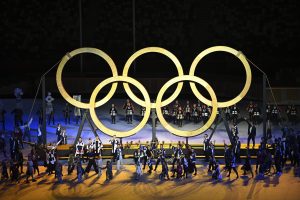The Tokyo Olympics will finally stage its opening ceremony in an almost empty stadium due to the rapidly rising cases of coronavirus in the capital.
The Games have divided the Japanese public and international community. On Thursday, Tokyo recorded its fifth highest daily number of COVID-19 infections and experts predict that new daily infections in Tokyo are headed toward a record-breaking 3,000 cases in the first week of August.
Japan’s slow vaccine rollout and the spread of the Delta strain has derailed its early success at the start of the pandemic and there are escalating concerns that the Games will become a super-spreader event. Japan’s worsening coronavirus outbreak led to the decision to bar local spectators from Olympic venues in Tokyo on June 8.
The national stadium holds a capacity of 68,000 spectators. But after a one year delay, the opening ceremony will be a subdued affair. The Tokyo Organizing Committee plans to have about 950 people attend the opening ceremony: 800 foreign officials and 150 local officials. But the real number of attendees may be smaller. With the capital under a state of emergency and public opposition to holding the Games during a pandemic, many politicians and business leaders have been eager to avoid being seen at the opening ceremony.
Fewer than 15 foreign dignitaries will attend the opening ceremony, with those coming including U.S. First Lady Jill Biden, French President Emmanuel Macron, and WHO Director General Tedros Adhanom Ghebreyesus, who has backed the Games as having the “power to inspire” the world. From the Japanese side Emperor Naruhito, Prime Minister Suga Yoshihide, Tokyo Governor Koike Yuriko, and President of the Tokyo Olympic Organizing Committee Hashimoto Seiko will be in attendance.
On the other hand, according to NHK, former Prime Minister Abe Shinzo won’t attend the opening ceremony despite leading Japan’s successful bid to host the Games in 2013. He appeared in the 2016 Rio de Janeiro Closing Ceremony dressed up as Super Mario to promote the Tokyo 2020 Olympics.
Toyota Motor Corp, Panasonic Corp, Procter & Gamble Co, NEC Corp, and Fujitsu are just some of the Olympic sponsors that will not be sending executives to the opening ceremony. Toyota explained it would be wrong to attend the event given that the public has been barred from the event. Other executives have commented that they prefer to watch the Games on television as a regular citizen rather than attending in person. Toyota also cancelled all its Olympics-related TV commercials, which is a major setback for improving the image of the Games and convincing a highly skeptical and largely unvaccinated public that it’s okay to press on with hosting the event.
Tokyo Olympics spokesperson Takaya Masa acknowledged a “mixed public sentiment” in the run-up to the Games and responded that “there must be a decision within companies on how they should convey their message to the public from its corporate perspective.”
Japanese Prime Minister Suga pledged to hold a “safe and secure” Games and one central countermeasure is keeping athletes sealed inside an Olympic “bubble” to shield both athletes and the public from COVID-19. But the virus has already infiltrated the athletes’ village, and so far more than 100 infections have been confirmed among domestic and foreign Olympic-related athletes and staff across Japan.
Under the current unprecedented circumstances, the Opening Ceremony is the only chance athletes will have to experience Japanese culture and the parade of nations is one of the most anticipated and traditional parts of the ceremony. Some 6,000 athletes from 200 countries are expected to march on Friday but this also raises questions around the risk of COVID-19 for participating athletes.
Additionally, the countdown to the Tokyo Olympics has been battered by a series of new scandals. On Monday, the composer in charge of the opening ceremony music, Oyamada Keigo, was dismissed after confessing to bullying disabled students while at school in a past interview. This was soon followed by the Olympics Opening Ceremony director being fired on Thursday after a video surfaced showing him make a joke about the Holocaust.

































